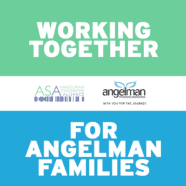
Joint Initiative between ASA and ASF
The International Angelman Syndrome Alliance (ASA) and the Angelman Syndrome Foundation (ASF) announced a newly formed joint initiative: the Global Community Advisory Board (CAB). They will work together to represent the Angelman community as a unified voice when engaging with pharmaceutical companies looking to enter research programs.
The CAB will act as a consulting service to stakeholders involved in the research, development, reimbursement and service provision of biomedical treatments or processes, including both scientific and policy-related issues.
Supported by Eurodis, the European organization for Rare Disorders, the Angelman CAB will be a group of trained advocates who use their knowledge and expertise to discuss and advise on the latest developments, challenges and issues related to medical treatments and procedures under development in Angelman syndrome.
Speaking at the signing of the newly formed Board, Betty Willemsen, Chair of ASA said “We are excited to work with ASF to be a constructive voice for all Angelman families. This initiative will allow us to train our members in the area of research development to ensure the best outcomes for projects we are funding and supporting now and in the future.”
CEO, Amanda Moore of the Angelman Syndrome Foundation said. “We are stronger when we work together to support the AS community. We are so thankful to be invited to this strong partnership to further our work towards therapeutic treatments.”
For more information, contact Betty Willemsen (bwillemsen@angelmanalliance.eu)
ASA is an alliance of parent support organizations from countries including UK, Ireland, Belgium, Netherlands, Germany, Austria, France, Italy, Portugal, Japan, Israel, and Spain who have pooled resources and funds in order to advance research into the syndrome. Their mutual aim is to increase the financial support of dedicated research projects and thereby intensify research on Angelman Syndrome specifically.

